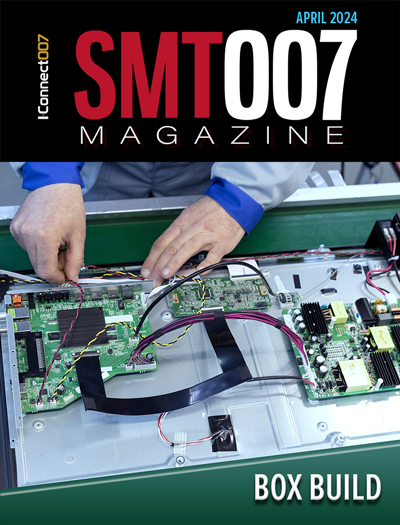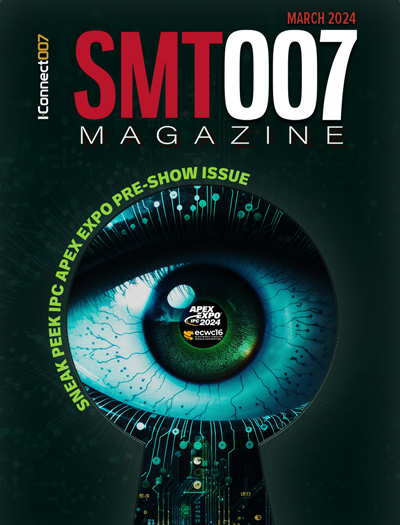-

- News
- Books
Featured Books
- smt007 Magazine
Latest Issues
Current Issue
Box Build
One trend is to add box build and final assembly to your product offering. In this issue, we explore the opportunities and risks of adding system assembly to your service portfolio.

IPC APEX EXPO 2024 Pre-show
This month’s issue devotes its pages to a comprehensive preview of the IPC APEX EXPO 2024 event. Whether your role is technical or business, if you're new-to-the-industry or seasoned veteran, you'll find value throughout this program.

Boost Your Sales
Every part of your business can be evaluated as a process, including your sales funnel. Optimizing your selling process requires a coordinated effort between marketing and sales. In this issue, industry experts in marketing and sales offer their best advice on how to boost your sales efforts.
- Articles
- Columns
Search Console
- Links
- Events
||| MENU - smt007 Magazine
Solving Reliability and Thermal Management Challenges in Automotive Electronics
May 1, 2018 | Stephen Las Marias, I-Connect007Estimated reading time: 3 minutes
Paul Salerno is the global portfolio manager for SMT assembly solutions at Alpha Assembly Solutions. He has more than a decade of experience in the electronics assembly industry in roles such as application engineering, project management, and product management. Paul is responsible for developing and executing strategies for the automotive and consumer electronics market segments, ensuring Alpha’s products continue to meet the evolving needs of their global customers.
In this interview with SMT007 Magazine, Paul discusses the growing automotive electronics industry, its impact on the soldering materials business, and how Alpha helps customers address the new challenges and requirements in the automotive market.
Stephen Las Marias: The automotive electronics market has been one of the driving forces of the electronics manufacturing industry. What is the impact of this on your business?
Paul Salerno: The solder market continues to flourish, and we see an upward demand for automotive electronics from OEMs due to the sophistication required for modern vehicles. The continual adoption of the HEV/EV powertrain, advanced driver-assist systems (ADAS), and in-cabin electronics is driving the need for more sophisticated assembly solutions. For example, advanced detection systems such as lane departure warning, adaptive cruise control, LIDAR, RADAR, and vision systems that were once reserved for luxury vehicles are now becoming more common in the average consumer vehicle. Each one of these technologies presents itself with unique challenges that require customized solutions.
Las Marias: What are some of these “unique challenges”?
Salerno:Reliability, of course, is a major driving factor to the successful implementation of an assembly material in automotive electronics. Specifically, exposure to high-temperature and high-vibrational environments for powertrain and advanced detection devices creates a need for assembly materials that exhibit excellent creep resistance. The combination of the end product’s performance requirements as well as exposure to environmental stresses is driving increased reliability demands on the assembly materials.
Thermal management is critical from both application and processing perspectives. In
powertrain applications facing high-operating temperatures, the ability to develop creep resistant alloys capable of facing temperature ranges from -40°C to 150°C is driving the need for high-reliability alloys such as InnoLot. Thermal management from a processing perspective is driving the need to develop low-temperature alloys capable of high reliability to prevent component warpage during reflow. Alpha’s HRL1 alloy exhibits excellent mechanical reliability relative to SAC305 while reducing processing temperatures by 50°C. This has proven to have a profound impact on reduction of component warpage leading to increased yields and enhanced product performance.
Las Marias: How do you help ensure the reliability of electronics assemblies for cars?
Salerno:The answer to this question really begins with the relationship we maintain with our customers. Maintaining a strong voice of customer enables Alpha to develop next generation products to meet the upcoming needs of the marketplace. Having a global R&D and technical service footprint allows Alpha the flexibility to quickly address customer needs, albeit on a production line or in the lab. We maintain a cutting edge analytical and diagnostic lab capable of characterizing assembly performance through use of equipment such as SEM/FEM, as well as conducting field tests such as thermal cycling and surface insulation resistance to qualify the performance of our products in a given application. For example, the ability to measure electrochemical migration and corrosion resistance of our solder pastes on fine-pitch components ensures the reliability of our products in advanced detection devices.
Las Marias: Are there new requirements being placed upon you by your customers dealing with automotive electronics?
Salerno: As always, demands are unique to the given application. The need for assembly materials capable of meeting operating temperatures above 120°C is commonplace for devices located closest to heat-generating sources of the vehicle. We are seeing thermal cycling demands of -40°C/150°C with requirements above 2,000 cycles for these powertrain applications. For advanced safety detection systems, not only are thermal cycling requirements increasing, but there is a growing need for fine pitched electrochemical reliability. It is not uncommon to see power density increasing and component sizes shrinking as these advanced detection devices become more sophisticated and miniaturized. Finally, for in-cabin electronics, a focus on total cost of ownership is driving the need for low-temperature, high-reliability alloys.
To read the full article, which appeared in the April 2018 issue of SMT007 Magazine, click here.
Suggested Items
Hentec/RPS Publishes an Essential Guide to Selective Soldering Processing Tech Paper
04/17/2024 | Hentec Industries/RPS AutomationHentec Industries/RPS Automation, a leading manufacturer of selective soldering, lead tinning and solderability test equipment, announces that it has published a technical paper describing the critical process parameters that need to be optimized to ensure optimal results and guarantee the utmost in end-product quality.
Empowering Electronics Assembly: Introducing ALPHA Innolot MXE Alloy
04/16/2024 | MacDermid Alpha Electronics SolutionsIn the rapidly evolving electronics industry, where innovation drives progress, MacDermid Alpha Electronics Solutions is committed to setting a new standard. Today, we are pleased to introduce ALPHA Innolot MXE, a revolutionary alloy meticulously engineered to address the critical needs of enhanced reliability and performance in modern electronic assemblies.
New Book on Low-temperature Soldering Now Available
04/17/2024 | I-Connect007I-Connect007 is pleased to announce that The Printed Circuit Assembler’s Guide to… Low-temperature Soldering, Vol. 2, by subject matter experts at MacDermid Alpha Electronics Solutions, is now available for download.
Inkjet Solder Mask ‘Has Arrived’
04/10/2024 | Pete Starkey, I-Connect007I was delighted to be invited to attend an interactive webinar entitled “Solder Mask Coating Made Easy with Additive Manufacturing,” hosted by SUSS MicroTec Netherlands in Eindhoven. The webinar was introduced and moderated by André Bodegom, managing director at Adeon Technologies, and the speakers were Mariana Van Dam, senior product manager PCB imaging solutions at AGFA in Belgium; Ashley Steers, sales manager at Electra Polymers in the UK; and Dr. Luca Gautero, product manager at SUSS MicroTec Netherlands.
TE Connectivity Orders Hentec Industries/RPS Automation Pulsar Solderability Testing System
04/09/2024 | Hentec Industries/RPS AutomationHentec Industries/RPS Automation, a leading manufacturer of selective soldering, lead tinning and solderability test equipment, is pleased to announce that TE Connectivity has finalized the purchase of a Pulsar solderability testing system.


